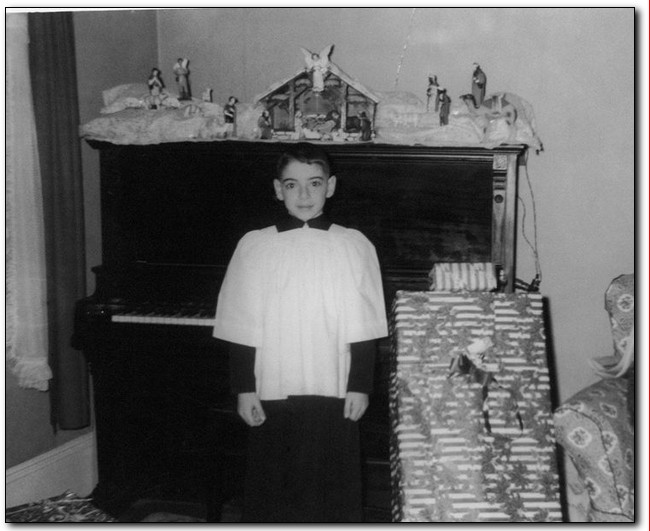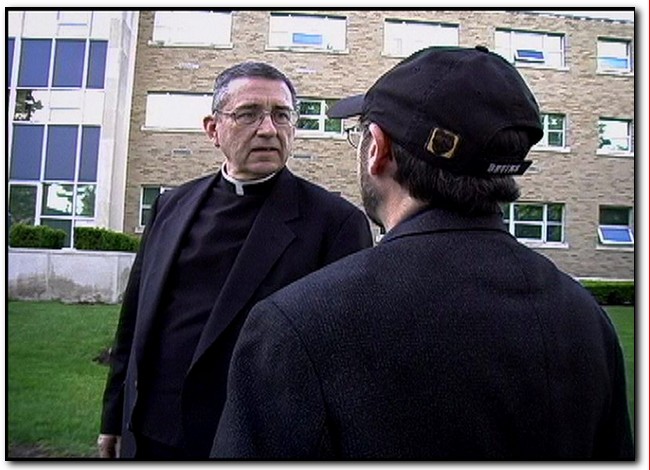Documentary Chronicles Abuse Victim's Ordeal, Confrontation with Catholic Church
By Kim Mulford
Cherry Hill Courier Post [Salem MA]
January 13, 2007
http://www.courierpostonline.com/apps/pbcs.dll/article?AID=/20070113/COLUMNISTS10/701130306/1004/LIVING
The newspaper ads were simple: Do you remember Father Birmingham? There was a New York address. That was it.
That was enough. Dozens of letters arrived, enough to back Paul Cultrera's allegations of sexual abuse by a priest during private counseling sessions in a rectory bedroom in Salem, Mass., 30 years earlier.
It was December 1994, before allegations of child sexual abuse in the Catholic Church became numbingly familiar and well before the church began making sweeping changes in how it would respond to the complaints.
 |
| Paul Cultrera served as an altar boy at St. James Parish in Salem, Mass., at age 13. He was sexually abused by a priest. Courtesy of Zingerplatz Pictures |
Cultrera's story was turned into a Frontline documentary and will air Tuesday on PBS. Shot by his filmmaker brother, Joe Cultrera, Hand of God takes a detailed look at how sexual abuse affected one man, his family and their faith. It is shared matter-of-factly as if to a family member, through scenes shot while cooking dinner, flipping through photo albums or wandering through the old homestead.
It's a story that should be heard, if only to understand how much abuse hurts.
Cultrera's first sexual experience was at the hands of Father Joseph Birmingham, who molested him at age 14. Cultrera kept it secret for 30 years.
 |
| Paul Cultrera, reflected in a window, is the subject of the 'Frontline' documentary 'Hand of God.' He was abused by a priest as a child. Courtesy of Zingerplatz Pictures |
"When you're totally wrapped up in the environment of sin and guilt, you internalize it yourself. At least I did," Cultrera explains in the film. "I decided it was my fault. It was something the matter with me. You think you've done something really bad. So you become very adept at drawing a huge circle around that part of your life."
He became quiet and withdrawn over the years. He left the church. He left jobs. He left his wife. He drove across the country and moved to the West Coast. But no matter where he went, his secret followed him.
It wasn't until his former wife asked if he had ever been abused that Paul Cultrera began talking about what had happened to him as a kid. After learning about the death of Birmingham, Cultrera finally decided to confront the church and investigate whether the Archdiocese of Boston had covered up allegations against the priest. He put the ad in newspapers wherever Birmingham had worked. Eventually, he learned there were nearly 100 other children like him.
 |
| Filmmaker Joe Cultrera confronts Bishop Richard Lennon, former interim head of the Boston Archdiocese, is a scene from 'Hand of God.' Courtesy of Zingerplatz Pictures |
Abusive priests, including Birmingham, were routinely moved from parish to parish. Allegations were kept secret and victims were advised to keep quiet, enabling known abusers to continue harming children.
The abuse is horrific in itself. But Cultrera's story about how church officials reacted to his allegations is sickening, too. They appear callous and unsympathetic.
No apology is offered by the church in the film, aside from Cultrera's recollection of a priest who told him, "I'm so sorry to hear this," when he first reported the abuse. It's infuriating to watch.
Are things any better today?
Andrew Walton, spokesman for the Camden Diocese, hasn't seen the Frontline film yet. But, he said, it is reasonable to criticize the church for its failings. He called the sex abuse scandal a "disgraceful, shameful moral failure."
Walton said sexual abuse of children is less prevalent in the church than in other segments of society, like the family. But given the church's mission, it has a moral obligation to enact the strongest possible policies to prevent it from happening again, he added.
"The church has acknowledged how grievously it failed in the past in dealing with many of these cases," Walton said. "The sexual abuse of minors by a cleric is a horrendous betrayal of trust. It can never be minimized or glossed over . . . That really requires an acknowledgment that it happened and the deepest apology to victims and to the Catholic people."
In 2002, following widespread media coverage, the U.S. Conference of Catholic Bishops announced sweeping new policies in reaction to the sex abuse crisis.
Now, for example, any allegation of sexual abuse must be reported to local law enforcement. Prevention is stressed through training and background checks. There is zero tolerance for accused priests; they are immediately removed from ministry.
Those are good changes, acknowledged Barbara Polesir, who leads the South Jersey chapter of SNAP, or the Survivors Network of those Abused by Priests. The 68-year-old Southampton resident joined SNAP because her nephew was sexually abused as a child.
But more has to be done, she said, including the release of all names of credibly accused priests, and changes to New Jersey's statute of limitations law, which the church opposes.
Hand of God is powerful and upsetting to watch, said Polesir, who has seen the film a couple of times. Now that it will be shown on PBS, she hopes it will bring the issue to the attention of more people.
It certainly can never be forgotten.
Keeping the Faith looks at religion and spirituality in South Jersey. The column appears on Saturdays.
Reach Kim Mulford at (856) 251-3342 or kmulford@courierpostonline.com.
Related:
Camden Diocese Spokesman Discusses Abuse Issue
Any original material on these pages is copyright © BishopAccountability.org 2004. Reproduce freely with attribution.